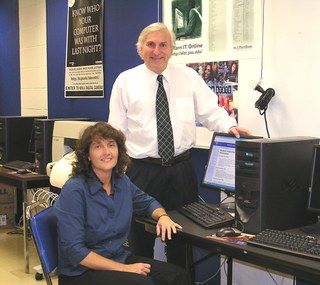Within the framework of a modern Information Technology work team, what makes one person successful and another less so? What components of that work team ensure the team's success? These questions provided the impetus for a faculty/student research project at Penn State Worthington Scranton's Information Science and Technology department. The project, entitled "Information Technology Team Achievement: An Analysis of Success Factors and Development of a Team Success Model (TSM)" has been accepted as a peer-reviewed journal article in Team Performance Management, an International Emerald Journal, and a leading international business publication on teamwork and team processes.
Dr. Alan Peslak, assistant professor of IST at Penn State with more than 25 years practical experience in manufacturing and service industries knows first-hand that the majority of Information Technology projects in the real-world are dealt with by teams. "The ability to function as an IST professional today," said Dr. Peslak, "virtually mandates an understanding of how teams function, and, perhaps most importantly, the ability to place oneself within a working IST team and contribute in a positive way."
Dr. Peslak chose Marcy Stanton, a recent IST grad and former Northeast Woman, as a partner in the research project. "Ms. Stanton is an outstanding individual, a recent IST grad currently working in the field locally," added Dr. Peslak. "She brought a great deal of insight and first-hand observation to the project."
Ms. Stanton summarized the basic approach used by herself and Dr. Peslak. "Our approach was this," she said: "based on a review of existing literature, and given the need to improve success of IT projects, we posed a general research question, 'Can an overall team success model (TSM) be developed that includes the relationships between demographic variables, team and personal process factors, emotions, and overall team success?' This question," she explained, formed the void we wanted to fill."
Dr. Peslak summed up the goals of the research. "We were looking for factors that both enhanced and served as obstacles to optimal IST team functions," he said. "The goal was to create a model for team makeup."
The Peslak/Stanton project looked at performance and group process analysis in addition to factors such as the emotional reactions of workers, individual psychology and even trust between members.
The pair studied 55 students grouped in 18 teams. The teams ranged from two to five "workers." Team progress was measured at several stages in semester-long team projects. Forty-four separate questions were studied in each measurement stage.
Dr. Peslak summarized the research findings. "Our research develops and validates a series of factors that lead to IT team success," he said. "These include emotion, personal processes, and team processes. Within these parameters we were able to quantify the significance of individual factors and the relationships between many of them. We also found that students' grade point index (GPA) had a positive impact on team processes and that negative emotions showed a negative correlation with team processes. Team processes and trust had positive impacts on projects.
While the pair recognizes that they were dealing with a relatively small sample group, they also agree that implications for creating a model for success are clear. Stanton said, "the challenges for managing IST teams begins with an understanding of group dynamics extends to owning the responsibility for self management." Peslak noted that once individuals own the responsibility for managing themselves within a group, they have laid critical groundwork toward becoming a professional.
"At Penn State," said Peslak, "we really have a commitment to bringing students very close to real-life, practical IST situations. It isn't all circuits and wiring. IST management is a very human enterprise and our students need to learn to operate in a world of people, solving IST challenges."
Dr. Alan R. Peslak is an Assistant Professor of Information Sciences and Technology at Penn State University. He received his Ph.D. in Information Systems from Nova Southeastern University, Fort Lauderdale, Florida. His research areas include information technology social, ethical, and economic issues as well as information technology pedagogy. Publications include the Communications of the ACM, Information Resources Management Journal, Journal of Business Ethics, Journal of Computer Information Systems, Journal of Information Systems Education, Team Performance Management, Information Research, and First Monday. He has over 25 years of diverse manufacturing and service industry experience.
Marcy L. Stanton is a recent Information Sciences and Technology graduate from Penn State University. She received numerous awards during her undergraduate career, including the President's Freshman Award, Outstanding Scholar Award, IST Academic Excellence Award, and the Christopher Sturchio Honor's Program Service Award. In addition, she was a three-time recipient of the Richard M. and Jean McNichols Walsh Scholarship, and was chosen as a Northeast Woman of the Week for the Scranton PA Sunday Times newspaper. She is currently employed as an IT helpdesk analyst for Siemen's, working at Met Life, Clark's Summit.
